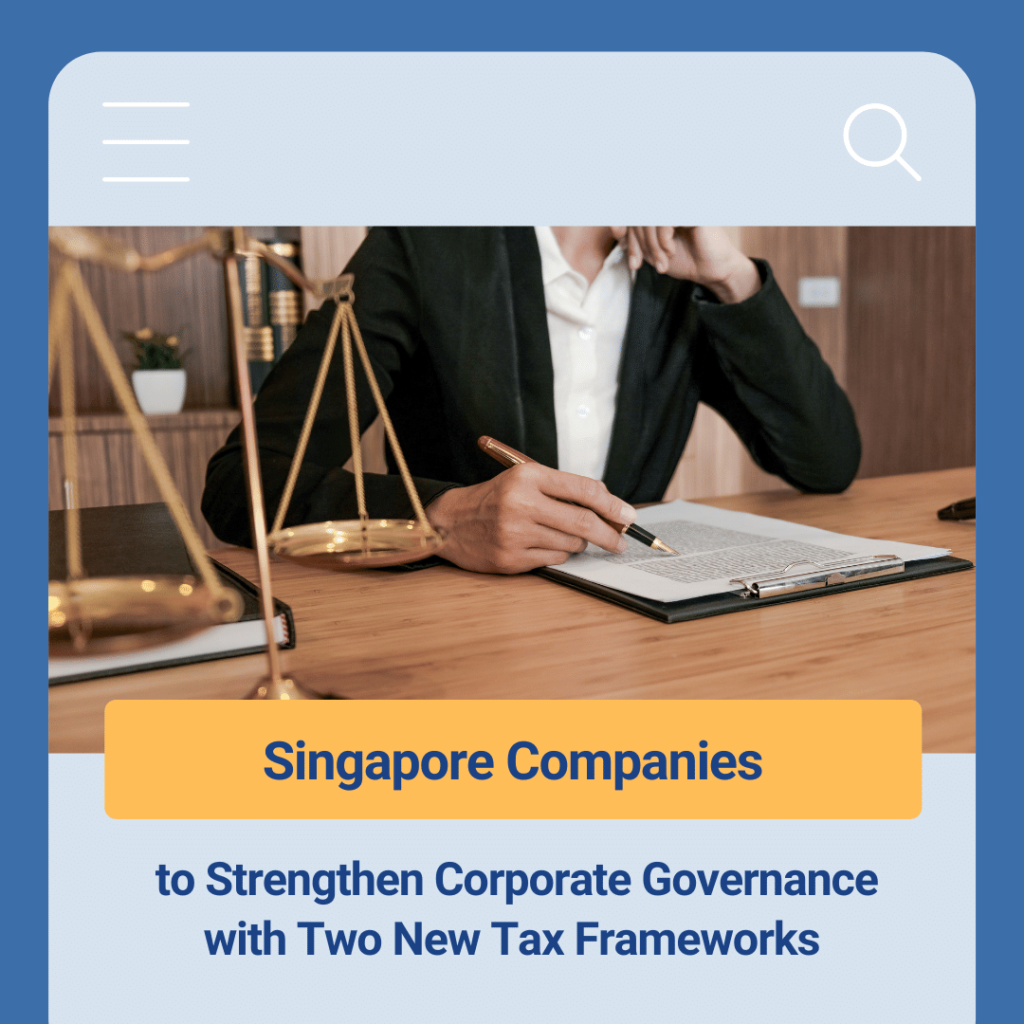 0
0
SHOPPING CART

To assist businesses in strengthening tax compliance, the Inland Revenue Authority of Singapore (IRAS) introduced two new tax frameworks: The Tax Governance Framework (TGF) and the Tax Risk Management and Control Framework for Corporate Income Tax (CTRM).
The TGF and CTRM intend to supplement the existing Goods and Services Tax Assisted Compliance Assurance Programme (GST ACAP). Together, they offer voluntary compliance tools (see Annex A – Overview of IRAS’ Tax Governance and Tax Risk Management Initiatives for Companies) that businesses may use holistically or as independent programs, depending on their readiness and business needs.
The TGF focuses on improving a company’s tax governance standards and raising them to the Board level. It includes a collection of broad ideas and practices centred on three primary pillars of excellent tax governance: compliance with tax legislation, a governance structure for managing tax risks, and relationships with tax authorities.
The framework applies to both Corporate Income Tax (CIT) and Goods and Services Tax (GST), and it may be used by any firm committed to excellent tax governance. Companies that achieve TGF status may benefit from an extended grace period for voluntary admission of tax errors:
(i) A two-year one-time extended grace period for voluntary disclosure of CIT and/or withholding tax irregularities incurred within two years after TGF status grant.
(ii) A one-time extended grace period of three years for voluntary disclosure of GST errors made within two years of the date of award of TGF status for a GST-registered business without ACAP status; or a one-time extended grace period of two years for voluntary disclosure of GST errors made within two years of the date of award of TGF status for a GST-registered business without ACAP status.
The CTRM supports big firms with complex structures and business models in developing effective internal controls and processes to identify, manage, and monitor critical CIT risks. The framework includes a self-review checklist with processes and methods to demonstrate that solid controls are in place to manage tax risks, such as the tax governance structure, entity-level controls, and tax reporting controls. Eligible organizations that achieve CTRM certification will get the following benefits:
The following are the primary advantages of the ICAP:
(i) A one-time penalty waiver for voluntarily admission of earlier years’ CIT and/or withholding tax irregularities.
(ii) Reduced CIT compliance audit for three consecutive years of assessment beginning on the day IRAS grants CTRM Status.
“While the TGF, CTRM, and GST ACAP are all optional compliance programs that function independently, we highly urge businesses to implement all three frameworks to ensure sufficient internal controls and procedures to manage their tax risks.” Companies will gain the trust of their stakeholders by demonstrating that they successfully manage tax risks, are honest about their tax problems, and benefit from lower compliance costs in the long run.
“IRAS will continue to work closely with firms to assist them in developing a sustainable infrastructure that enables voluntary compliance,” stated Mr Ng Wai Choong, Commissioner of Inland Revenue/Chief Executive Officer.
IRAS co-designed the frameworks with numerous stakeholders during the development process, including the Singapore Chartered Tax Professionals (SCTP), Big 4 accounting firms, and many influential organisations, to ensure that they satisfy the needs of businesses. IRAS also undertook a pilot program with four big business groups to test the frameworks, and the input from the pilot groups was integrated into the final frameworks.
Singtel was one of four business groupings to take part in the trial initiative. “The pilot initiative provided a fantastic opportunity for us to work with IRAS on a proactive evaluation of our tax risk management procedures, as well as providing our comments for IRAS’ calibration of the CTRM and TGF,” said Mr. Arthur Lang, Singtel Group Chief Financial Officer. This comprehensive and organized examination has confirmed the effectiveness of our tax controls and assisted us in improving their efficiency.”
Mr. Low Weng Keong, Chairman of the SCTP, also advised enterprises to invest in addressing tax risks and liability exposures. “As the pace of international tax reforms accelerates, excellent tax governance will become increasingly anticipated,” he added. The principle-based frameworks, TGF and CTRM, will assist enterprises in establishing a methodical structure that will prepare them for the future while also reinforcing Singapore as a responsible and transparent corporate environment.”
To learn more about Singapore incorporation, economy, banking, etc., feel free to call/WhatsApp us at +65 90612851 or email us at aceglobalacct@gmail.com. Alternatively, you may leave us a reply using our contact form below.
Keep in touch to receive the latest listing, news updates and special offers delivered directly to your inbox.
